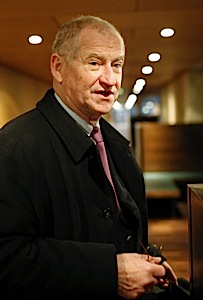 Inevitably, he aroused dislike and indeed enmity. Even an official government report accused him of basing his accusations on “unproved assertions and gossip”. Soon the niçois were using the nickname that had followed him from an earlier posting in Chambéry: “The sadist in a black hat”. Although some asserted that he was himself an ex-Freemason (while others said he was a member of Opus Dei, the secretive Catholic organisation made famous by Dan Brown), he launched a frontal attack on the men in aprons, claiming that criminals, from offenders against planning laws to paedophiles, had benefited from their protection. His belligerent approach was largely vindicated by a series of sometimes quite spectacular corruption cases, some involving Nice City Hall in the time of Jacques Peyrat (who seems to have been genuinely shocked by some revelations).
Inevitably, he aroused dislike and indeed enmity. Even an official government report accused him of basing his accusations on “unproved assertions and gossip”. Soon the niçois were using the nickname that had followed him from an earlier posting in Chambéry: “The sadist in a black hat”. Although some asserted that he was himself an ex-Freemason (while others said he was a member of Opus Dei, the secretive Catholic organisation made famous by Dan Brown), he launched a frontal attack on the men in aprons, claiming that criminals, from offenders against planning laws to paedophiles, had benefited from their protection. His belligerent approach was largely vindicated by a series of sometimes quite spectacular corruption cases, some involving Nice City Hall in the time of Jacques Peyrat (who seems to have been genuinely shocked by some revelations). Of de Mongolfier’s own probity there can be no doubt and he has wryly recalled attempts to win his favour with anything from the offer of a free apartment to an invitation to pick up (without payment) whatever he wanted in a local DIY store.
Christian Estrosi, it’s no secret, will not be shedding a tear as de Montgolfier leaves to take up his last posting before retirement as Procureur général in Bourges. He promises to be back in the city by the end of 2013, this time as a pensioner. He has objected to some of the mayor’s measures, sometimes in ways which not everyone has seen as constructive. He claims that the now highly efficient municipal police have been encouraged to exceed its powers; he’s come out against a night curfew for youngsters even though it’s known they commit a lot of offences after dark; and – more convincingly – he’s questioned the mayor’s cam-paign against prostitutes. “I feel sorry for the girls. They’re victims. It’s the pimps we should be targeting and then maybe the clients.”
Finally, as he leaves, he sounds more philosophical about the realities of Nice: “You can’t get away from it: where there’s money, there’s corruption.”

